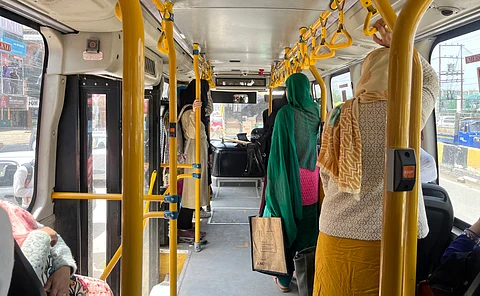

SRINAGAR: A government initiative to offer free bus rides to women in Srinagar has sparked a growing controversy just weeks after its launch, as commuters and transport workers alike raise serious concerns over discrimination, mismanagement, and economic fallout.
Launched on April 1, under the banner of the Zero Ticket Travel Scheme, the plan aimed to empower women by granting them free access to state-run smart buses. But what began as a step towards inclusion has quickly become mired in public dissatisfaction and operational chaos.
Many women commuters now say the scheme has resulted in mistreatment by drivers and conductors, who they allege are increasingly reluctant to stop for female passengers.
Muskaan, a young medical student, described how the atmosphere in buses has changed since the scheme began. She recalled how, before the initiative, drivers would ensure that reserved seats for women were respected, often asking men to vacate them.
“Now men sit on those seats and no one says a word,” she said.
“There have been times when drivers have allowed men to board while shutting the doors on waiting women. They even use overloading as an excuse to not take us in.”
For some, the consequences have been more than just frustrating. Rubi Shafi, who suffers from a spinal disc problem, said she has been repeatedly ignored by smart bus drivers.
“I’m a disc patient. I tried to get the bus to stop, but it didn’t,” she said. “When the scheme launched, buses stopped for women anywhere. Now, they just drive past, and I am left waiting.”
Her experience echoes the sentiments of many who believe the scheme, though well-intentioned, is now being poorly implemented.
Critics argue the scheme has failed to deliver its promised benefits and has instead become a source of humiliation for women.
Politician and social activist Jibran Dar described the initiative as “an insult rather than an honour,” claiming that drivers now avoid stopping for women because they do not want to offer free rides.
In a widely shared social media video, Dar said, “Had there been no such scheme, they would have been treated with dignity. We don’t need token gestures. The government should focus on supporting students and daily wage earners.”
Drivers Defence
Bus drivers, however, say they are struggling to keep the system running amid growing misuse. Showkat Ahmad Wani, a driver operating a smart bus, said the scheme is being exploited for non-essential travel.
“Most women now use these buses to run daily chores. Some travel only a few hundred metres, which delays the entire system,” he said.
Another driver, Ashiq Hussain Shikari, described how women frequently board buses in unsafe conditions or stop them mid-traffic, which he claimed leads to congestion and increased risk of accidents.
“They don’t wait at proper stops. They flag us down wherever they like, even in heavy traffic. It causes jams and sometimes even threatens safety,” he said.
Drivers also report instances where, after refusing to stop in unsafe areas, they are chased by male relatives of the female passengers who force them to halt the bus. “They come on bikes, block the way, and argue with us for not stopping,” said Shikari.
He warned that due to overcrowding and lack of regulation, genuinely needy women are now being left behind as buses fill up with short-distance travellers. He stressed the need for better oversight to ensure the scheme helps those it was intended to support.
The smart buses were introduced in Srinagar in 2023 under the Smart City Project, extending services to neighbouring Budgam and Ganderbal districts. Fully air-conditioned and widely appreciated for their comfort, these electric buses have grown popular among commuters.
Since the free ride scheme began, ridership has surged.
According to official data accessed by a local news agency, daily passengers have doubled from around 20,000 to over 40,000. Yet this spike has strained operations and revealed the shortcomings of the system under pressure.
The scheme, which fulfills a campaign promise made by the National Conference during last year’s elections, follows previous efforts like former Chief Minister Mehbooba Mufti’s introduction of pink buses in 2016 — buses reserved for women but not free.
However, those services were discontinued following political changes. Now, as the government once again attempts to position itself as a champion of women’s rights, some commuters feel that a broader and more inclusive approach is needed. Several have pointed out that students, elderly people, and low-income male workers, who also face financial hardship, have been excluded from the scheme.
Private bus operators have also taken a hit. Mohammad Aslam, a local bus driver, said that business has plummeted since the scheme was rolled out.
“Our buses used to run at 98 per cent occupancy. Now, they’re nearly empty,” he said. “We used to do four to five shifts a day. Now we’re lucky if we manage two.” He explained that earnings have fallen to such an extent that covering fuel costs is now a struggle. “It’s hard to support our families. We’re not even breaking even,” he added.
As the scheme enters its second month, discontent continues to grow among commuters, drivers, and transport workers. What was envisioned as a progressive measure to improve mobility and dignity for women has instead triggered a cascade of complaints over poor planning, discriminatory practices, and economic disruption.
With both public opinion and traffic snarls piling up, the government now faces mounting pressure to reassess the scheme’s design and ensure it does not do more harm than good.
Have you liked the news article?